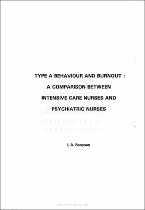| dc.description.abstract | Nursing evolved as an altruistic response toward helping others, particularly in the realm of maintaining and restoring health (Dolan, Fitzpatrick & Hermann, 1983). This particular role involved providing physical and emotional comfort and care to the sick and has, through
the ages, been voluntary or delegated to certain women who have proven to be particularly adept at caring for the sick in their respective communities. Therefore, nursing was not a role expected of all women but was reserved for those who had the ability and desire to
nurture others (Dolan et al., 1983).
The first nurses were independent figures who performed the duties not only of nurse, but also of nutritionist, pharmacist, physical therapist, and social welfare worker (Dolan et al., 1983). Although their initial response to, and treatment of, illness was intuitive, knowledge about illness and the treatment thereof was continuously being improved upon. Trial and error and basic problem solving resulted in the accumulation of a body of knowledge which gradually developed and expanded. | en_US |

